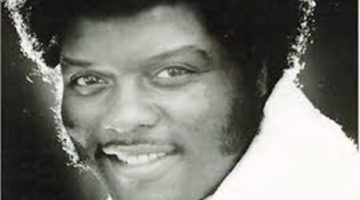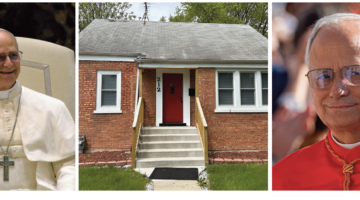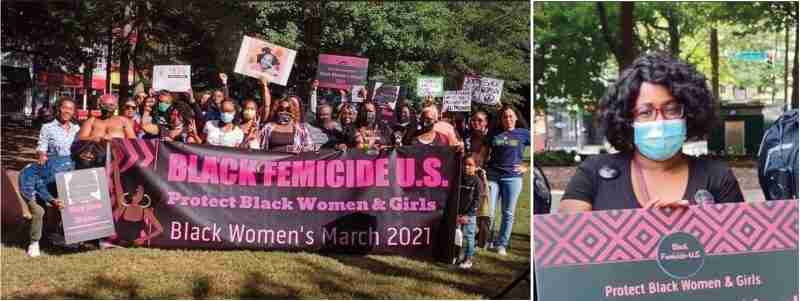Fort Lauderdale, Fla. – Pat Cowan, 20, was an aspiring actress. Cowan had acted in few plays and was a part of a small acting troupe called Detroit’s Finest Light Vibrant Essence Theatrical Co. On a chilly Sunday, April 9, 1978, Cowan headed out to audition for the lead role in a play. She was so excited to do so because the role would pay $100 a week. That was good additional money for the young woman who was a keypunch operator with a four-year-old son named DeQuan. Upon arriving at the audition, in the garage of a home on Midland Street, with DeQuan by her side, Cowan was bludgeoned from behind with a sledgehammer. The assailant turned the sledgehammer on DaQuan. Pat’s lifeless body and that of her seriously injured son were placed back in her vehicle and driven to an-other location where they were found by a group of children playing. DaQuan survived. The assailant, James Thomas, wasn’t a playwright or a writer. It was 51 degrees that April evening in 1979. Terri Chapman, 20, and her 3-year-old son, Antonio, left a motel on Detroit’s west side to accept a ride to a family member’s home on Ward Street. Upon arriving, Terri exited the car and then reached in to get Antonio. With her son in her arms, Terri walked towards the home. To her horror, an assailant shoots her son at point-blank range; the bullet exits Antonio and strikes Terri in the chest. They both fall to the concrete. The assailant then proceeded to shoot Terri in the head. Antonio screams, and the shooter turns his attention to the young child, silencing him with a bullet.
The alleged assailants were her boyfriend and the child’s father, Anthony Thompson, 20, and his friend, Alex Hayes, 19. The couple had been in an on-and-off relationship since they were teenagers. There were numerous allegations of abuse in the relationship. But who could have predicted such a devastating end? Seventeen years later, same city. January 4, 1996. That Friday, the frigid cold temperatures were in the teens with a high of 20 degrees. Nicole Washington and 18-month-old daughter Alaka made their way to the home of Michael J. Anderson in the 20400 block of Hawthorn Street. Nicole and Anderson had a tumultuous relationship filled with violence, kidnapping, assault and stalking. With such a brutal history, Washington’s family was adamant about Nicole keeping a distance between herself and Anderson. However, Nicole, who was also the mother of twin sons, did not want to sever the ties between her child and Anderson. So, Nicole continued to maintain contact with Anderson, unbeknownst to her family. A missing person’s report was filed with the Detroit Police Department by Washington’s mother later that January day when she failed to arrive home. Washington’s Ford Escort was spotted by cousin Lisa McGee a block from Anderson’s residence the following day. There would be blood found inside. The grisly details of what happened to Nicole Washington would reveal an unspeakable nightmare of torture, killing and mutilation.
These three all have one important factor in common: They are Black women. Murdered Black women. Mostly forgotten to the communities in which they lived and worked. Names without faces. Remembered by loved ones, family members, and friends, with only the shocking details of their fate etched in the archives of local newspapers. Yet their tragic endings are not rare or confined to one geographical location. The murders of Black and indigenous women are a nationwide epidemic. An invisible epidemic. When murder victim Gabby Pepito’s remains were discovered in Wyoming last September, another shocking revelation was exposed. In that same state, over 700 indigenous women and girls were missing. Some had been found buried in the same park in which Pepito was found. The national media focus had been on one White young woman, when there is an entire community of missing women and girls of color that is virtually invisible and forgotten.
Rosa Page, a mental health nurse living in Arkansas, noticed the disparities in media coverage and law enforcement response to missing and murdered Black women and girls and decided to bring attention to this crisis by starting a nonprofit organization called Black Femicide-US. Femicide is the killing of women perpetrated by men based on gender. The World Health Organization defines femicide as a crime against women “committed by intimate partners or ex partners,” or could “involve ongoing abuse in the home, threats or intimidation, and sexual violence.”
In the Black community, violence against Black women perpetrated at the hands of Black men happens at such frequency that it becomes difficult to keep up. On Facebook in December 2021, Baltimore native Rajaee Black, 44, went live to confess he had murdered pregnant ex-girlfriend Tara LaBang, 41, and was at the front door of ex-wife Wendy Black, 42, to murder her as well. There were domestic violence allegations peppering both relationships. Black would commit suicide after the murders.
Domestic violence became another central thread in the murder of 19year-old Katherine Newhouse at the hands of her father Howard, 57, on Sunday in Cherokee County, Ga. Page believes that at the heart of Black femicide lies the root problem of misogyny. “Misogyny is very intertwined in our culture,” she said in a recent interview from her home in Arkansas. “Misogyny has been observed in our homes and in our music. Black men have been coddled culturally … because of systemic racism, police brutality. Black men were raised to be protected at all costs.” This conscious and unconscious protection of Black men and boys creates the environment where domestic violence against Black women is silenced leaving Black women vulnerable and shamed, and their offspring witnesses to a cycle of violence that becomes generational or familial.
When the topic of domestic violence against Black women at the hands of Black men is broached, Page admits that the clapback is intense. “The subject is viewed as ‘divisive talk.’” The issue of Black femicide became the focus of her crusade when she began to take a closer look in 2015. At that point in time, there weren’t public statistics on Black femicide, so Page started to document the murders of Black women and girls, the first person in the U.S. known to do so. According to Page’s research and data, Black women “are being murdered every five to six hours a day,” leading her to create the hashtag, #everysixhours on Twitter. When she released her findings in 2020 on Black femicide, 1,164 Black women and girls had been murdered.Three days later the FBI released its own statistics of 1,440.
Black femicide and femicide are not viewed as a hate crime in the United States, whereas in many countries around the world it is. Page is working with United Nations officials and others to create legislation that will make femicide a hate crime and secure tougher sentences for offenders. What she is also proposing is a national registry for men who commit acts of violence against women. It would work like the sex offender’s registry. Men who perpetuate acts of femicide on women often have an extensive history of domestic violence, such as in the case of Michael J. Anderson who murdered Nicole Washington. “My cousin wasn’t the only woman he (Anderson) had abused,” Lisa McGee disclosed. “He had another case pending in court that he was due to make an appearance in the day after he murdered her.”
Can tougher sentencing laws for those guilty of domestic violence and Black femicide make a difference? Experts affirm that this is possible, but sometimes the justice system itself fails to protect the vulnerable in society as in the case of Michael J. Anderson. Maggie Williams Drake, the judge presiding over Anderson’s other domestic violence case, allowed him to be out on bond, even though he had a history of violence against women. Rosa Page’s proposal of a domestic violence registry sounds good to McGee’s ears. “If there was a registry like this,” she said, “women could save themselves and their children. We have to put a stop to this.” Page intends to do just that by bringing national attention to Black femicide. Black Femicide-U.S. is planning a September march at the Washington Monument. “My hope is that we start taking a hard look at this issue,” she said. “It may seem insurmountable, but it can be done.”
To assist Rosa Page and Black Femicide-U.S, visit gofundme.com/f/fundraiser-for-2022black-femicide-march-in-dc










No Comment